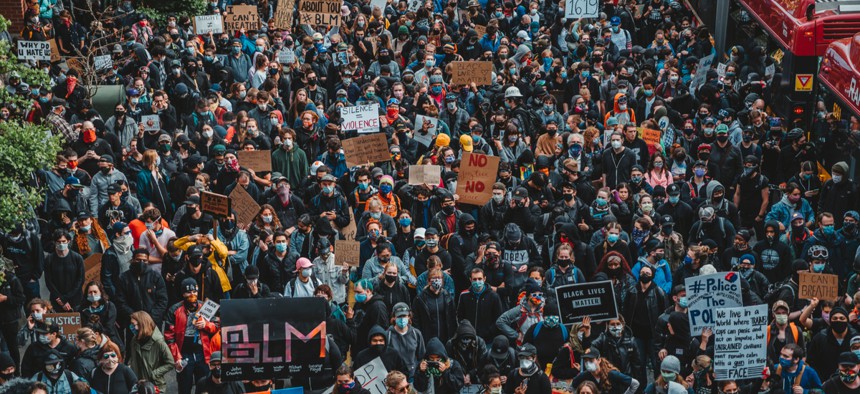Unchecked Power? How Law Enforcement Could Leverage Facial Recognition During Protests

Protesters in Seattle on June 2, 2020. The potential for law enforcement to leverage facial recognition during protests could threaten civil rights and civil liberties. Cameron Thomsen/SHUTTERSTOCK
COMMENTARY | The lack of regulation around facial recognition usage allows law enforcement to use the technology in ways that could undermine civil rights and liberties.
When Washington state passed a law earlier this year regulating police use of facial recognition, some cited it as a model for other states and the federal government. Largely because facial recognition remains mostly unregulated in the United States, many were excited for any attempt to rein in the technology.
But make no mistake: Washington’s law doesn’t do enough to protect civil rights and liberties. These shortcomings are currently on display amid the sustained protests for racial justice. As police respond to protests with extreme force and increased surveillance, there is nothing in the Washington law—or most laws around the country—to stop law enforcement from using facial recognition on protesters.
Washington’s law, sponsored by a legislator who is currently a Microsoft employee and supported by the company’s lobbying efforts, fails to meaningfully address the vast majority of actual facial recognition searches. It requires a warrant for ongoing surveillance, real-time or near real-time identification, or persistent tracking. But most facial recognition searches today that lead to investigations and arrests don’t fall under these categories, and could therefore continue unchecked. This includes its use on protesters.
Across the country, law enforcement uses surveillance tactics to discourage protest attendance and retaliate against protesters. This surveillance can include running facial recognition algorithms on footage from surveillance cameras, police body-worn cameras, cell phones and social media, enabling police to identify, track and target protesters.
This isn’t a hypothetical. Police in Baltimore County used facial recognition during the 2015 Freddie Gray protests. According to a tech company “case study” obtained by the ACLU of Northern California, Baltimore County police ran facial recognition searches on photos of protesters that were posted on social media. The document says police searched these photos for people with unrelated outstanding warrants and then targeted them for arrest directly from the crowd, although the police agency later denied having facial recognition technology.
Protesting is protected by the First Amendment. If police use facial recognition on protesters, searching for individuals with outstanding arrest warrants, it could discourage attendance. This threatens free speech and peaceful assembly, and is a dangerous abuse of power.
Police could be using facial recognition on protesters right now. Police departments in Seattle, Dallas and Austin, as well as the FBI, have asked the public to send them videos and photos of protesters to identify people suspected of breaking the law. This is particularly troubling considering facial recognition makes mistakes more frequently on people of color, women and young people. And recent research found that technology struggles to identify people wearing masks, a particular concern now as many protesters are wearing them to prevent the spread of Covid-19. Black and brown communities are already over-policed and over-surveilled and law enforcement’s response to current protests will only exacerbate this. Essentially, the people on whom the technology is being used the most are precisely the people on whom it works the least.
As long as the potential for law enforcement to use facial recognition remains unchecked, it continues to prove ripe for abuse.
Other states and the federal government that are looking to address police facial recognition must go further than Washington’s law in protecting civil rights and liberties. A moratorium on government use of facial recognition is a good place to start. Already, San Francisco and Boston have banned the technology, and federal lawmakers recently proposed placing a moratorium on its use. Unless and until strong, enforceable, substantive protections are put in place, law enforcement shouldn’t use facial recognition technology.
Jameson Spivack is a policy associate with the Center on Privacy & Technology at Georgetown Law. He studies how law enforcement uses face recognition and other AI-assisted technologies.
NEXT STORY: Why Can’t We Just Have Class Outside?





